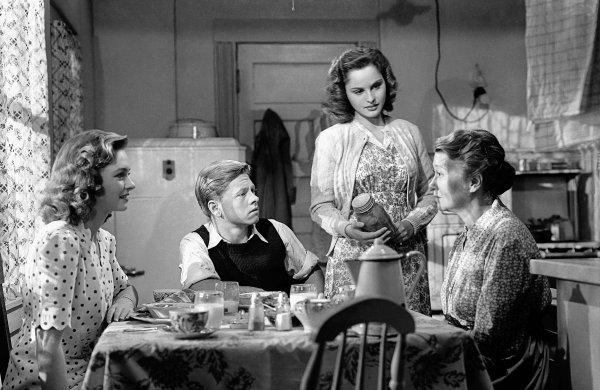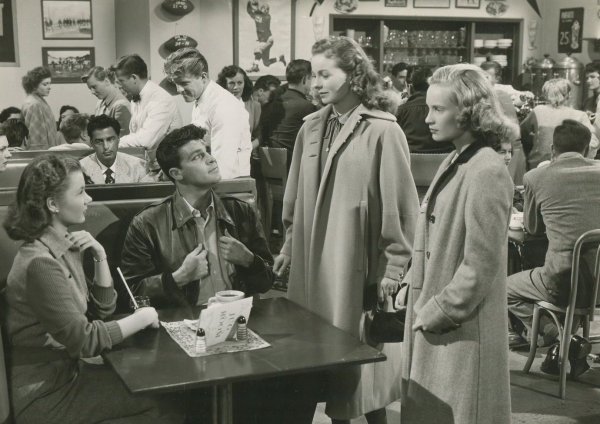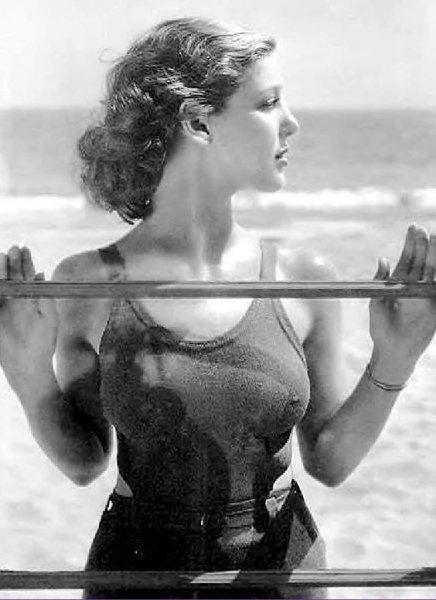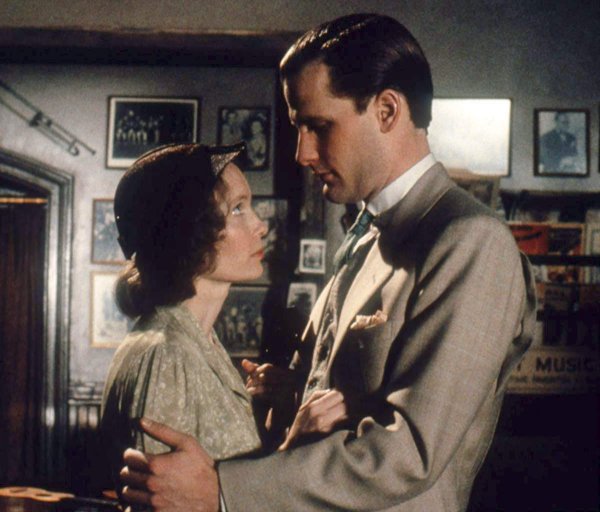- Messages
- 17,464
- Location
- New York City
The Hard Way from 1943 with Ida Lupino, Dennis Miller, Joan Leslie and Jack Carson
They packed a lot into this classic story of a struggle to escape a hardscrabble existence. Older sister Ida Lupino sees her talented teenage singer/actress younger sister, Joan Leslie, as their ticket out of a dreary steel town. So, she leaves her reasonably decent steel-worker husband - nothing gets in Lupino's way in this one - and takes Leslie on the road to start her career.
There, they meet the struggling vaudeville team of Dennis Miller and Jack Carson. Seeing an opportunity, ruthless Lupino steers Leslie into a marriage to Carson. Miller, a good-guy playboy - he has a fun woman in every town - sees through Lupino, but can't stop the ill-fated marriage nor Lupino's passive-aggressive efforts to push him out.
While palliated for the code, Lupino, who is physically attracted to handsome Miller, has - and this is the phrase for - hate sex with Miller, but she's still hurt when he brushes her off afterwords. And he's not wrong, as she's been awful to him and Carson, so he leaves Lupino and the act.
Worse still, later, as Leslie's star starts to rise, Lupino manipulates a separation for Leslie from, now, not-needed Carson even though the marriage is working (spoiler alert) causing Carson to commit suicide. Again, nothing will get in Lupino's way to turn her sister into a star.
Next up, Lupino, effectively, destroys the last career chance of a fading Broadway star just to create an opportunity for her sister. It's a gut-wrenching scene as Lupino "befriends" the older actress and, then, gets this battling-alcoholism woman drunk before her key rehearsal: old star out, sister in.
Finally, though, after being her sister's pawn all these years, Leslie pushes back and takes a vacation without Lupino at a resort where she accidentally meets Miller, who has, since their split years ago, become a successful bandleader. We are now at the movie's money moment as the man Lupino pushed aside to advance her sister's career, the same man Lupino slept with and was hurt when he, then, brushed her off, has a genuine love affair with Lupino's sister.
By the time Lupino gets to the resort, Miller and Leslie plan to marry, which sparks one last successful machination from Lupino. She guilts her sister back to the stage and away from Miller with the old saw about "how much I sacrificed for you," and she reminds her sister that all their money is tied up in the new show.
But the spell's been broken and Leslie, after one night where she collapses on stage, quits the play and marries Miller. Phew, as noted, a lot happens, but really very little could be a spoiler alert as the movie opens with Lupino - well dressed - attempting suicide. Then, dying in a hospital, the story is told through flashbacks until, in the very final scene, we learn if Lupino makes it or not.
It's a shame that the suicide construct begins and ends the movie as this solid, albeit, well-tread story stands on its own without the awkward suicide framing. Regardless, it's a good almost two-hours of watching a ruthless woman pull her sister and herself up from poverty by mercilessly ploughing down every obstacle in their way. And as she does, your sympathies switch several times - as happens often in real life.
I can't call this a post script or a nota bene as it's too ugly. Early in the movie, there is an almost tossed-off line delivered by the manager of a theater who offers to help the struggling vaudeville team of Miller and Carson out even though he has to let them go as they aren't drawing a crowd.
The manager is trying hard to strike a fair balance between his business needs and being a good guy to the team. But when the team rejects his offer of help - not in anger, but pride - almost to himself, the theater manager says (paraphrasing), "when this gets out, people will say 'dirty Heb'," clearly referring to himself.
That's it, the movie moves on without any further note of that comment. But you know, that line didn't wander into the movie by itself, so someone - a writer, director, producer - wanted to make a point about antisemitism. Even under the Motion Picture Production Code, some poignant social commentary made it into movies, often, in a quiet but effective way.
@AmateisGal, I believe you are a fan of Dennis Miller and think you would enjoy this one as, of the movies of his that I've seen, this is one of his best.






